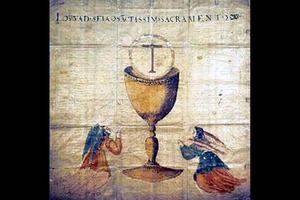Pope Francis: Every Christian Must Be Prepared for Martyrdom
Quoting Blessed Oscar Romero, the Pope said, 'We must be willing to die for our faith, even if the Lord does not give us this honor.'

VATICAN CITY — Pope Francis reflected on Friday on the life and death of Blessed Oscar Romero, who was recognized as a martyr earlier this year, stressing that each Christian ought to be ready to give his or her life for the faith.
“A martyr is not born. It’s a grace that the Lord allows, and that in a way concerns every baptized person,” Pope Francis told a group pilgrims from El Salvador on Oct. 30.
Blessed Oscar Romero was archbishop of San Salvador (the Salvadoran capital) from 1977 until his March 24, 1980, martyrdom.
Quoting a phrase of Blessed Romero, the Pope said, “We must be willing to die for our faith, even if the Lord does not give us this honor.”
To give one’s life doesn’t only consist of being killed, he said, but “to give one’s life, to have the spirit of a martyrdom, is to surrender it in duty, in silence, in prayer, in the fulfillment of duty; in this silence of everyday life; to give one’s life little by little.”
The Salvadorans met with Pope Francis during their pilgrimage to Rome, made in thanksgiving for the recent beatification of Archbishop Romero.
He was killed while saying Mass, and in February, Pope Francis officially recognized his death as having been for hatred of the faith.
He was beatified in El Salvador on May 23. The same day, Pope Francis declared that the martyr’s feast will be celebrated March 24 each year — the day “in which he was born into heaven.”
In his speech to the Salvadoran pilgrims, Pope Francis noted that, since the beginning of the Church, Christians have been convinced that the blood of the martyrs “is the seed of Christians.”
Even today, the blood of many Christians continues, in a dramatic way, to be poured out in the world, he said, explaining that these people give their lives with the certainty that it will bear fruit and lead to an increase of holiness, justice, reconciliation and love of God.
Francis noted that a martyr isn’t someone stuck in the past, serving as just “a beautiful image adorned in our churches that we remember with a certain nostalgia.”
“No, the martyr is a brother, a sister, who continues to accompany us in the mystery of the communion of the saints and who, united to Christ, does not ignore our earthly pilgrimage, our sufferings, our anguish.”
The Pope drew attention to the many others who have lost their lives for the faith in the recent years of El Salvador’s history, including Father Rutilio Grande. A Jesuit priest and good friend of Blessed Romero, Father Grande was assassinated in 1977, just three years before the archbishop himself.
Both Blessed Romero and Father Grande, as well as many other Salvadorans who were killed in hatred of the faith, weren’t afraid to die and have therefore “won and have been made intercessors for their people.”
In unscripted remarks, Pope Francis said that it mustn’t be forgotten that Blessed Romero’s martyrdom began long before his death, with witness, suffering and persecution.
As a young priest who witnessed what was happening at the time, Francis said that even after the archbishop was assassinated, “he was defamed, slandered, his memory despoiled, and his martyrdom continued also for his brethren in the priesthood and in the episcopate.”
During his time as archbishop of San Salvador, Blessed Romero had been a vocal critic of the human-rights abuses of the repressive Salvadoran government, and he spoke out on behalf of the poor and the victims of the government.
Because of this advocacy for the poor, many accused the archbishop of supporting Marxist interpretations of liberation theology. However, theologians who worked closely with the archbishop have found no proof of the accusations, but argue that his love of the poor was rooted in Church teaching and the Gospel.
The Pope stressed that the rumors aren’t mere hearsay, but are things that he himself heard, adding that Blessed Oscar Romero is a man who continues to be a martyr even today.
“After having given his life, he continues to give it by allowing himself to be assailed by all this misunderstanding and slander,” he said, adding, “This gives me strength.”
“Only God knows the stories of those people who have given their lives, who have died and continue to be stoned with the hardest stone that exists in the world: language.”
Pope Francis said that as the Jubilee of Mercy begins in a few weeks’ time, Blessed Oscar Romero serves as a stimulus for Salvadorans to proclaim the Gospel with renewed vigor, advancing the causes of true justice, peace and reconciliation.
Like Blessed Oscar Romero, Francis said he longs to see the day when “the terrible suffering of many of our brothers, due to hate, violence and injustice, would disappear.”
He closed by quoting the late archbishop and praying that the Lord send “a shower of mercy and goodness, with a flood of graces,” which converts the hearts of all Salvadorans.
“May the name of the Divine Savior bring conversion in a country where all feel redeemed and as brothers, without differences, because we are one in Christ our Lord.”
- Keywords:
- martyrdom
- oscar romero
- pope francis

















